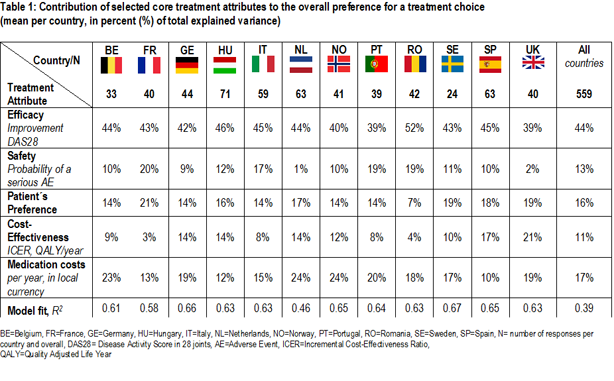Session Information
Session Type: ACR Poster Session C
Session Time: 9:00AM-11:00AM
Background/Purpose:
Economic considerations and patient preferences are
increasingly important when choosing treatments. It is not known to what extent
rheumatologists across Europe account for these factors when changing drug therapies
in patients with active rheumatoid arthritis (RA).
Objectives:
To evaluate the extent to which rheumatologists across
Europe consider costs, cost-effectiveness and patient preferences in addition
to efficacy and safety in treatment decisions in RA.
Methods:
In a discrete choice experiment, rheumatologists were
asked to choose iteratively between two unlabeled drug treatment options for a
hypothetical RA patient with moderate disease activity who failed two synthetic
DMARDs. The treatment options were characterized by five attributes further
specified by three levels; efficacy (level of improvement and achieved state of
disease activity), safety (probability of a serious adverse event), patient
preference (level of agreement with proposed treatment), medication costs and
cost-effectiveness (incremental cost-effectiveness ratio (ICER)).
Attributes and levels were selected based on
literature data and expert consensus. An efficient experimental design was used
to construct 14 treatment choices and a mixed logit model was used to estimate
the relative importance of attributes.
Results:
559 rheumatologists from 12 European
countries contributed to the analysis (50.2% females, mean age 48.3 years).
When choosing treatments for RA patients, efficacy was the most important
attribute in all participating countries (44%, range 39-52%). Overall, safety
also played an important role for treatment decisions (13%) however varied
between countries (2-20%). Importance of safety increased with increasing risk of
severe adverse events. Patient preference contributed importantly (16%),
especially when patients disagreed with the proposed treatment.
Relative importance of economic
attributes varied (1) between countries and (2) among individual
rheumatologists. In the majority of countries, absolute costs were more
relevant for treatment decisions than relative cost-effectiveness. Contributions
of attributes to treatment decision (overall and per country) are summarized in
table 1.
Conclusion:
Drug efficacy clearly remains the most important driver for treatment decisions in all European
countries however rheumatologists also take into account economic aspects in their treatment
decisions. In most countries, overall
costs are still more important than cost-effectiveness considerations. Patient preferences are taken into account, indicating
rheumatologists take steps towards patient centered care.
To cite this abstract in AMA style:
Hifinger M, Hiligsmann M, Ramiro S, Watson V, L. Severens J, Fautrel B, Carmona L, Uhlig T, van Vollenhoven R, Jacques P, Detert J, Scirè CA, Berghea F, Péntek M, canas Silva J, Keat A, Boonen A. Rheumatologists Consider Patient Preferences and Costs When Choosing Treatments for Rheumatoid Arthritis (RA) Patients. a Cross-European Discrete Choice Experiment [abstract]. Arthritis Rheumatol. 2015; 67 (suppl 10). https://acrabstracts.org/abstract/rheumatologists-consider-patient-preferences-and-costs-when-choosing-treatments-for-rheumatoid-arthritis-ra-patients-a-cross-european-discrete-choice-experiment/. Accessed .« Back to 2015 ACR/ARHP Annual Meeting
ACR Meeting Abstracts - https://acrabstracts.org/abstract/rheumatologists-consider-patient-preferences-and-costs-when-choosing-treatments-for-rheumatoid-arthritis-ra-patients-a-cross-european-discrete-choice-experiment/

